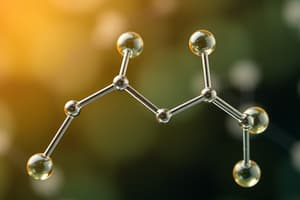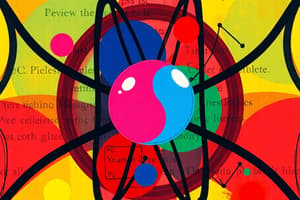Podcast
Questions and Answers
What is the mass spectrum of an average sample of a pure element shown in the figure above?
What is the mass spectrum of an average sample of a pure element shown in the figure above?
Zr
The ideal gas law best describes the properties of which of the following gases?
The ideal gas law best describes the properties of which of the following gases?
- N2 (correct)
- He
- O2
- CO2
The forces among Br2 molecules are stronger than those among Cl2 molecules.
The forces among Br2 molecules are stronger than those among Cl2 molecules.
True (A)
Which of the following has the bonds arranged in order of decreasing polarity?
Which of the following has the bonds arranged in order of decreasing polarity?
If the absorbance of the mixture is 0.2 at 453 nm, how many moles of Fe were present in the 100 ml sample?
If the absorbance of the mixture is 0.2 at 453 nm, how many moles of Fe were present in the 100 ml sample?
What is the reaction equation for the first ionization energy of an element?
What is the reaction equation for the first ionization energy of an element?
What is the hybridization of the C atoms before and after the reaction in the given reaction?
What is the hybridization of the C atoms before and after the reaction in the given reaction?
Why is MgO not able to conduct electricity while MgO is a good conductor?
Why is MgO not able to conduct electricity while MgO is a good conductor?
What is the best representation of the contents of the box after the reaction of CO and O has occurred?
What is the best representation of the contents of the box after the reaction of CO and O has occurred?
What type of reaction occurs when CU is oxidized and the nitrogen atom in NO3 is reduced?
What type of reaction occurs when CU is oxidized and the nitrogen atom in NO3 is reduced?
What mistake did the student make regarding the cuvettes when measuring absorbance?
What mistake did the student make regarding the cuvettes when measuring absorbance?
What percentage of CuNO3 was produced in one student's experiment?
What percentage of CuNO3 was produced in one student's experiment?
Why did one student's reaction proceed at a much slower rate than others?
Why did one student's reaction proceed at a much slower rate than others?
What test would be most useful in determining if a substance is an ionic compound?
What test would be most useful in determining if a substance is an ionic compound?
Which of the substances has the highest boiling point, and why?
Which of the substances has the highest boiling point, and why?
If a solid labeled as NaCl contains 75% chlorine by mass, what conclusion can be made?
If a solid labeled as NaCl contains 75% chlorine by mass, what conclusion can be made?
What is the empirical formula of an oxide of sulfur containing 40% sulfur and 60% oxygen by mass?
What is the empirical formula of an oxide of sulfur containing 40% sulfur and 60% oxygen by mass?
What is the final pressure in an 8 L container after pumping in gases at 0 C and 1 atm?
What is the final pressure in an 8 L container after pumping in gases at 0 C and 1 atm?
What can be inferred from the complete photoelectron spectra of two unknown elements, X and Y?
What can be inferred from the complete photoelectron spectra of two unknown elements, X and Y?
Which compound has the higher boiling point and why?
Which compound has the higher boiling point and why?
Which compound is most likely to have the greatest solubility in water based on molecular structure and bond polarity?
Which compound is most likely to have the greatest solubility in water based on molecular structure and bond polarity?
If P(N2O4) is 1.33 atm when the system is at equilibrium at 70 C, what is P(NO2)?
If P(N2O4) is 1.33 atm when the system is at equilibrium at 70 C, what is P(NO2)?
Flashcards are hidden until you start studying
Study Notes
Mass Spectrum and Elements
- The mass spectrum indicates the presence of an average sample of zirconium (Zr).
Ideal Gas Law
- Nitrogen gas (N2) best demonstrates the properties defined by the ideal gas law.
State of Bromine and Chlorine
- At 298 K and 1 atm, bromine (Br2) exists as a liquid due to stronger intermolecular forces compared to chlorine (Cl2), which is a gas.
Bond Polarity
- Bond polarity decreases in the order: H-F > N-F > F-F.
Absorbance and Moles Calculation
- An absorbance of 0.2 at 453 nm corresponds to an initial presence of 4 x 10^-6 moles of iron (Fe) in a 100 ml sample.
Ionization Energy
- The first ionization energy measures the energy needed to remove an electron from a gaseous atom.
Hybridization Changes in Reactions
- Carbon atoms undergo hybridization changes from sp^2 before the reaction to sp^3 after the reaction.
Conductivity of Magnesium Oxide
- Magnesium oxide (MgO) cannot conduct electricity due to its fixed lattice structure, while molten MgO allows ions to move freely, enabling conductivity.
Reaction Products in Gas Mixtures
- The reaction of carbon monoxide (CO) and oxygen (O) produces carbon dioxide (CO2), resulting in a specific molecular arrangement post-reaction.
Redox Reactions
- The reaction between copper (Cu) and aluminum (Al) with nitric acid (HNO3) is classified as a redox reaction, where Cu is oxidized and nitrogen is reduced.
Absorbance Measurement Errors
- Incorrectly labeled cuvettes in spectrophotometry led to inaccuracies in measuring copper nitrate (CuNO3) concentration.
Reaction Yield Calculations
- A produced amount of 0.01 moles of CuNO3 indicates a yield of 32%.
Reaction Rate Variability
- A slower reaction rate noted in one experiment was attributed to using a diluted 1.5 M HNO3 instead of the intended 15.8 M solution.
Testing Ionic Compounds
- Electrical conductivity tests on aqueous solutions are effective in confirming whether a substance is ionic.
Boiling Points of Compounds
- Hydrogen fluoride (HF) exhibits the highest boiling point among Ne, HF, C2H6, and CH4 due to hydrogen bonding.
Impurity in Sodium Chloride Sample
- A sample containing 75% chlorine by mass implies contamination; pure sodium chloride (NaCl) typically has 61% chlorine by mass, indicating the presence of lithium chloride (LiCl).
Empirical Formula Calculation
- A sulfide oxide composition of 40% sulfur and 60% oxygen by mass corresponds to the empirical formula SO3.
Gas Pressure Calculation
- Mixing 4 L of helium (He), 6 L of nitrogen (N2), and 10 L of argon (Ar) results in a final pressure of 2.5 atm when contained at 0°C and 1 atm in an 8 L rigid container.
Nuclear Charge Inference in Elements
- From photoelectron spectra, it can be inferred that element Y possesses a greater nuclear charge than element X.
Boiling Points of Compounds
- Compound 2 has a higher boiling point than compound 1 due to its ability to form hydrogen bonds.
Solubility of Compounds
- Ammonia (NH3) is most likely the most soluble compound in water based on its molecular structure and bond polarity.
Pressure in Equilibrium Systems
- At equilibrium, with a pressure of 1.33 atm for N2O4, the pressure for NO2 is established at 2 atm.
Equilibrium Color Change
- A lighter color in the tube containing an equilibrium mixture suggests a shift in equilibrium conditions, likely due to temperature changes.
Studying That Suits You
Use AI to generate personalized quizzes and flashcards to suit your learning preferences.




